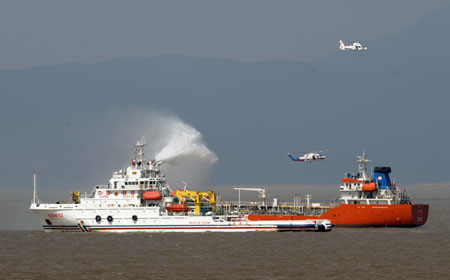Non-governmental rescue forces called for
In addition to rescue services from governmental authorities, non-governmental rescue forces were invited to participate in Friday's exercise.
"That conforms to the actual situation of China's maritime rescue, as most of the people involved in sea accidents are saved through non-government forces every year," Liu said.
He said there is a great number of small privately-owned boats in China and they are very flexible in rescue operations.
 |
|
Helicopters and rescue ships carry out rescue missions after a passenger ship collided with a cargo vessel during a maritime rescue exercise in the East China Sea, on Sept. 4, 2009. China's maritime rescue services staged their biggest ever exercise in the East China Sea Friday to test the country's maritime rescue capabilities and security for the Shanghai World Expo in 2010. [Xinhua]
|
"Their sailors are quite familiar with local maritime and weather conditions, and they can arrive at the site soon if an accident happens," he said. "While the professional rescue teams from government can better cope with very adverse conditions such as strong winds, huge waves and bad weather.
"Therefore, governmental forces are far from enough in rescue operations. They should be complemented by non-governmental rescue forces," he said, citing the great role played by volunteers in disaster relief after a devastating earthquake measuring 8 on the Richter scale struck southwestern China's Sichuan Province in May last year.
"The combination of the two forces will be the orientation for developing China' maritime rescue system," he added.
But the non-governmental maritime rescue forces are still in a starting phase and many of them complain of high risks and costs.
Guo Wenbiao, a 42-year-old fisherman from Zhejiang's Wenzhou City, is one of them. He has saved more than 130 lives at sea over the past two decades and asked for no rewards. But he has also almost used up his bank deposits for his unselfish deeds and leads a poor life now.
"I saved the first person from sea at the age of 15. From then on, I began rescuing people while fishing," he told Xinhua Friday in Ningbo. He was invited to observe the exercise as a VIP guest.
"Now, more and more people come to me for help, and I have to give up fishing and focus on rescue. I used to live a well-to-do life, but now, I mainly live on collecting rubbish at sea," he said.
"I hope the government can boost investment in non-governmental rescue forces," he said.
In September last year, the first non-governmental maritime search and rescue team on the Chinese mainland was set up in Wenzhou's Cangnan County where typhoons frequently visit. The team is composed of 148 fishermen volunteers and 30 boats. But the first thing they did was to raise funds to continue their normal operation.
"Currently, there are no special funds allocated for non-governmental rescue forces in China, which reduce their willingness to participate in rescue operations," He Yipei said.
"So it is a dire need for us to set up a compensation or reward mechanism to encourage more non-governmental forces to pitch in with rescue operations," he said.